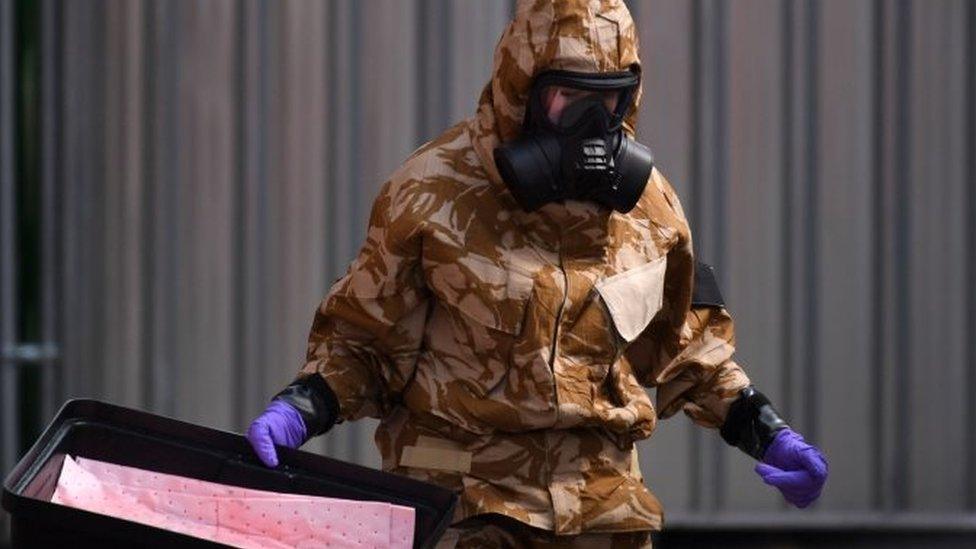How can you detect Novichok and other questions
- Published

A woman has died and a man is in hospital after they were poisoned by the nerve agent Novichok, four months after former Russian spy Sergei Skirpal and his daughter Yulia were attacked with the same substance.
Police and health chiefs answered questions at a public meeting for the residents of Amesbury and Salisbury - the two locations where the incidents occurred.
Here are some of the questions asked, with their answers.
Why can't the Skripals tell us what happened?
They had no idea they were being targeted and they have no idea how they were contaminated. The Met's assistant commissioner for specialist operations, Neil Basu, says they are "absolutely certain" their movements have been traced and they are certain the source of the nerve agent was Sergei Skirpal's front door in Salisbury.
Why can't you use detection equipment, like a Geiger counter that picks up radiation, for example?
Paul Cosford, medical director and director of health protection for Public Health England, says detailed swabbing for the agent needs to be done and then tested. Investigators also have to work out where the most likely places are to do the swabbing. "There's nothing that you could easily do to walk around with a detection machine that can give you a count, you've got to be led by intelligence," he says.
How long before it's absorbed in to the skin if you touch it?
A very low level of contamination can be dealt with by washing clothes at the time, Mr Cosford says. For a significant amount, absorption would take a maximum of six to 12 hours, or three hours for a high dose.
What if the Novichok is in a landfill site now? What happens then?
"If it was sealed in a container and it was in a landfill site it would effectively be safe because it would not be touched by anyone and it would last for probably - I've been told by scientists - 50 years," Mr Basu says.
Does Novichok decay?
Mr Cosford says: "My understanding of the science… is that in the environment it will be washed away and diluted to the extent it's not an issue. The decay itself does take a long time. If it's sealed in a container it will take a long time."
Is there an antidote?
"There are certain treatments that can be given to help the body to have time to recover," Mr Cosford says. "It's not an antidote but it is something that helps the body's systems to keep working whilst the body sorts itself out, which actually takes several weeks whilst it replicates some of the chemicals that have been destroyed by the poison."
Did they drink it/smell it /inject it?
Novichok was found on the hands of Charlie Rowley and Dawn Sturgess, so police believe they touched something.
Why is the investigation taking so long?
There are multiple scenes in the inquiry and a limited number of scientists and forensic medical officers, who are all volunteers. It takes forensic officers 40 minutes to get changed into their suits and they can stay in them for 15 minutes while collecting swabs, which have to be sent for testing. It takes 40 minutes to de-robe. Blood is taken from forensic officers before and after they enter a potentially contaminated area.
Are you confident you have located all of the areas these people visited and do you think there will be any more cordons going up?
Mr Basu says he cannot guarantee that all the areas have been located, which is why there is a witness appeal. But he adds: "Just because we cordoned something doesn't mean it's contaminated."
- Published11 July 2018
